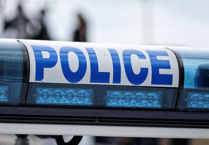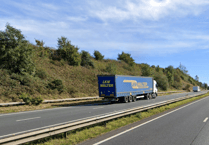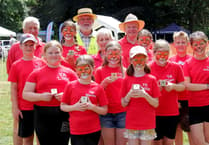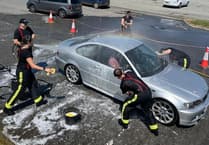ANY dog lover who has ever lost their beloved pet, even if only for five minutes, knows the growing feeling of panic when he or she fails to respond to their call. Fortunately, most of the time, there's a happy ending. But for anyone in that situation, a West Devon-based charity could be the answer to a frantic dog-lover's prayers. K9SearchDog was set up last year by bloodhound owner and lover Sam Clark who lives near Bridestowe. These gentle giants, with their huge ears and furry wrinkles, are stunning to look at — but they're not just a lovely face. Their talent is in their incredibly sensitive nostrils. Sam has owned and trained bloodhounds for human searching for 24 years. She said: 'When you train a bloodhound to search for humans, you have to train it not to look for any other species right from the start. 'But we were getting all these phone calls from people who'd lost their dogs, and I had to keep saying 'No', because it would have ruined the human searching training. 'Then I saw there was a lady in America who had trained bloodhounds to look for dogs and I thought, "I've one or two hounds about, I could do it" and I set it up as a bit of an experiment initially.' Another bloodhound trainer involved in the charity is based in Somerset and a third in the Lake District is currently training his bloodhound on dog scent and will be operational in that area soon. K9SearchDog is funded 100% through donations. The day to day costs of maintaining the hounds in training are funded entirely by their owners, and everyone involved gives their time voluntarily, fitting in training around their own busy lives. Sam is on call 24 hours a day — and does not charge for her services. She has two hounds that are fully trained to find dogs. One will be retiring shortly, but 16-week old Nettle, her newest hound recently brought in from Belgium, has just started training, with the possibity of another puppy joining in the autumn. Young Nettle's training was started in a low-key way, by playing with a dog she knows. The next step is to move the dog out of sight and she will be asked to find it. 'We start training them on really fresh scent, up to ten minutes old, and as they progress, it will go on until it's eight to eleven hours old,' said Sam. 'Once they lose eye contact, the nose goes to the ground and they start using it — it's as simple as that. 'We then start making trails longer, we start on fresh ground and then add in roads. We'll move on to industrial estates, night searches — we just make it more and more difficult, using different weather conditions etc.' It is hoped that if successful in her training, Nettle could be working for the charity within a year. That scenario is already looking hopeful — Sam said on her very first day she was tracking 200 metres at a gallop within minutes! When the dogs are tracking in rural areas they are kept on a long, 20ft line. A shorter, six foot one is used in built-up areas, and the handlers always wear high-vis clothing. Weather conditions make a difference in the way the hounds can pick up scent. Sam said: 'If you think of scent as moisture, when it's damp the scent stays longer, but as soon as it dries up, the scent goes really quickly.' Sam said bloodhounds were completely scent-driven. 'They don't use their eyes. If I throw a toy, the moment it hits the ground the dog starts tracking, they are just noses on legs really. It's all they are interested in, so training them is just about channelling their talent and tracking the right things.' Having said that, some bloodhounds make better trackers than others. Sam said: 'Some can be easily distracted, but Forager, once his nose is down, just goes for it. The air ambulance once landed about 100 yards away from him and he looked up vaguely, then carried on! They do become very focused on what they're doing!' Volunteers with dogs are very important in the work of K9Search Dog. By walking with their dogs on set routes, it provides Sam with the opportunity to allow her bloodhounds to track the dogs. Initially they will follow in one direction, but the crucial point is where the volunteers split apart, and the bloodhound has to follow the right scent. Sam said: 'This point comes after about six months' training. Hopefully they will follow the scent we've given them, but basically, if they can't pass that test, they're no good as a tracker dog. 'This is the real difference between bloodhounds and any other breed, their ability to discriminate scent.' Sam's dogs have been involved in many searches locally. A more memorable one took place in September last year, on the A30 near Whiddon Down. Sam said: 'This chap was a sort of New Age traveller, he lived in a van with everything he had in the world, He was travelling down to Cornwall and got up-ended by an out-of-control lorry. His dogs managed to get out, he caught one of them but the other two ran off. 'He spent four days going up and down the A30 calling for these dogs, then he got a sighting from a farmer, who said he'd shoot them if he saw them in with his sheep again! 'He got in contact with us and we tracked and tracked and tracked down through four fields and a lane and eventually found them. 'We had another one where a separated couple moved into two separate halves of a house, and each of them thought the dog was with the other. 'We tracked it all along the cliffs in North Cornwall and eventually found it about five miles away in a barn — I think they divorced after that!' Sam said that naturally enough, when people lose a dog, they start looking for their lost pet themselves — but the key to the bloodhounds being able to track and find a lost dog is speed, as the scent can be lost quickly. Then she can only take her dogs out to search once there has been a sighting. 'We had a call last Saturday about a dog lost on Dartmoor for 26 hours — if they had called us straight away we could have found it and saved them a lot of trouble — timing is really important.' The charity has recently had a real boost from the Kennel Club Charitable Trust, which granted it enough money to buy three decent quality radios. The radios mean that communications between handlers and back-up team are vastly improved, especially when training or searching on Dartmoor, where phone signals are poor. It also means that the team's safety is enhanced, and the charity's running costs will be reduced now they don't have to rely on mobile phones to communicate between handlers and team leaders. K9Search Dog is also working with university students on the formation of a special app, with which dog owners can record their pet's particulars, microchip numbers, distinguishing features etc to help the charity when called out to a rescue. Sam, who works as a photographer, said the fledgling charity, run by a hard-working committee of four, plus two handlers, could be hugely time-consuming when training, going out on call, dealing with emails and phonecalls along with everything else involved was added up. 'The woman who does it in America runs her dogs as a business — she was horrified when I said I wanted to do it as a charity! 'But I have my own business anyway, and I really wouldn't want to profit from other people's misery. 'It's another outlet for my hounds to work — I love seeing them work and to find a missing dog is wonderful. 'It's every dog owner's nightmare — it would certainly be mine,' she said. To find out more about K9 Search Dogs, visit http://www.k9searchdog,org">www.k9searchdog,org or visit their Facebook page. If your dog goes missing, call 01566 783233 or 07721 597926 as soon as possible.





Comments
This article has no comments yet. Be the first to leave a comment.